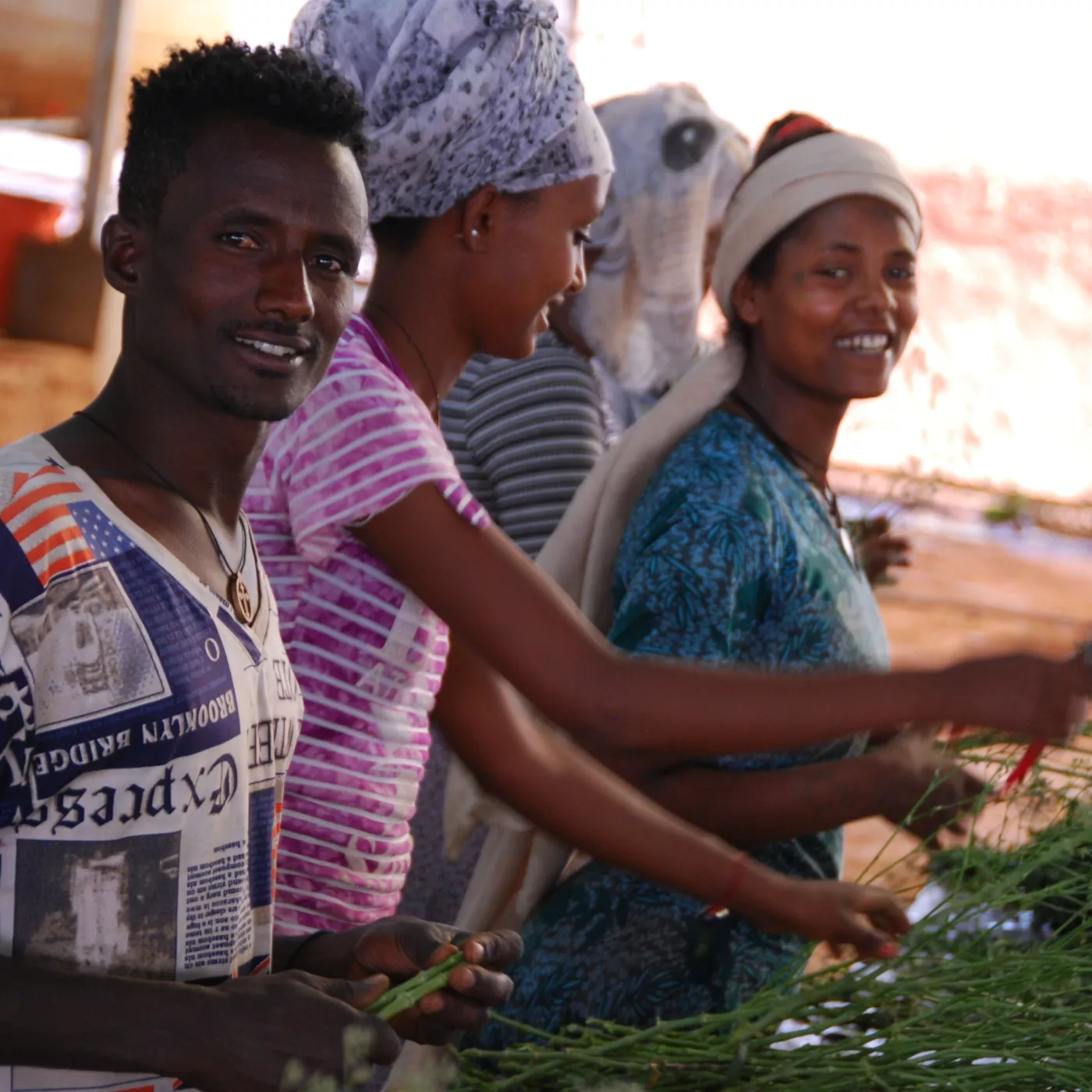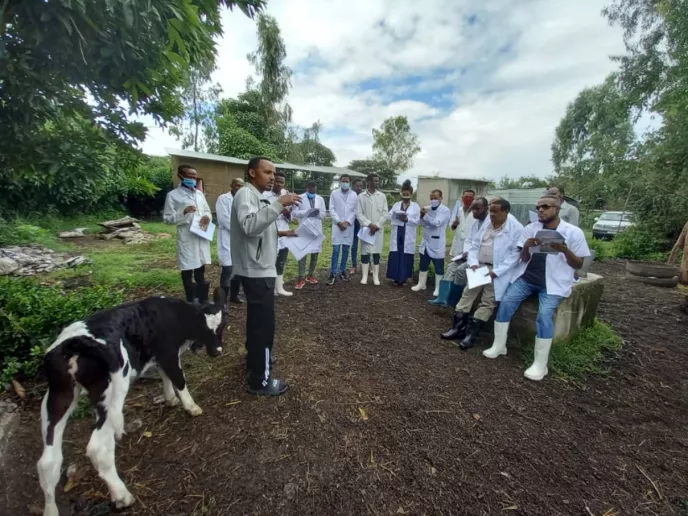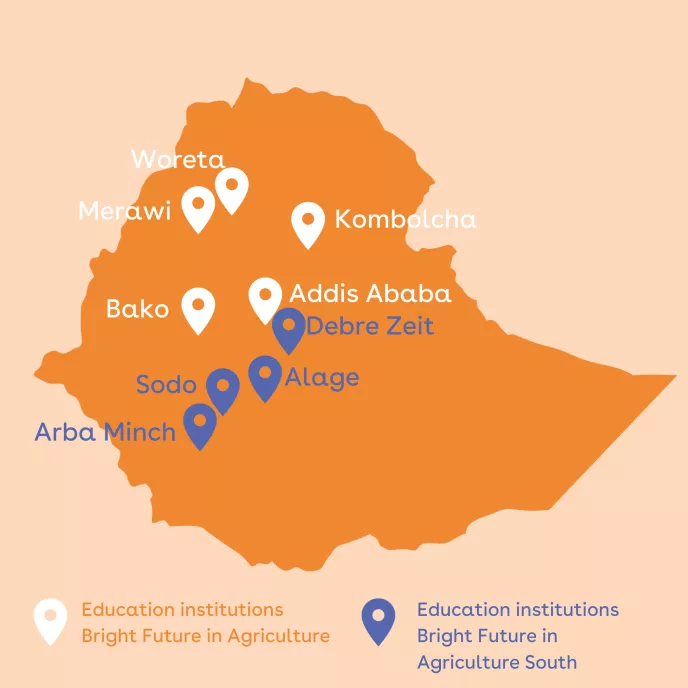Linking education to economic needs

Ethiopia heavily relies on agriculture. With a population of 105 million, 85% of its people work in this field. The country wants to boost its global competitiveness for which it must invest in development. Believing in the positive impact a Dutch-Ethiopian educational collaboration could have for linking education to economic needs, two projects were launched as part of the Orange Knowledge Programme to tackle this topic, both managed by Maastricht School of Management. After four years of implementation, we can now reflect on the success and lessons learned of these projects.
Pioneering progress in agriculture education
In 2019, one of the largest Orange Knowledge institutional collaboration projects, “Bright Future in Agriculture,” commenced. This initiative was centred on enhancing four distinct TVET colleges, with a special emphasis on dairy and horticulture. The project even extended beyond Dutch-Ethiopian collaboration, encompassing South-South partnership involving Jimma University and Stellenbosch University from South Africa who also shared their knowledge and experience for curriculum development. Building on the momentum, “Bright Future in Agriculture South” expanded the project in 2020 with a comparable strategy, concentrating on three additional TVET colleges and emphasizing horticulture and water efficiency. Both projects were managed as one programme under the brand-name ‘Bright Future in Agriculture (BFA)’ by the local office of Maastricht School of Management (MSM) in Addis Ababa. The local presence of the Nuffic project office in Ethiopia further helped to strengthen the impact of the initiatives.
“Schools didn’t teach skills. At the start of a new job, university grads used to search for laptops and chairs, when farming businesses wanted them to look for rubber boots and farm tools.”.
Between 2019 and 2023, the projects achieved remarkable milestones. A fundamental shift occurred in the relationship between the private sector and education, transitioning from detachment to active collaboration and mutual recognition of opportunities. In the past, businesses in Ethiopia were not interested in graduates from universities or TVET institutions. With help of the projects, universities and TVET colleges invested in their link with local markets and businesses, adapting curricula to match the skills needed for jobs. “Now this has completely shifted. Companies have opened their doors to education institutions and their graduates and feel responsible for keeping in touch with the field of education to play a role in the skills that graduates learn”.
The new collaboration between education institutions and over 40 local companies in horticulture, dairy, farming, and seed sectors as a result of the projects has shown beneficial to all. Furthermore, the establishment of innovation platforms, known as triple helixes, has fostered valuable dialogue among TVET organisations, universities, private sectors/industries, and government policymakers. The projects bridged the gap between different sectors that are playing a role in the link between education and labour market for the first time in Ethiopia’s history.

Photo by Maastricht School of Management
Together with MSM, consortium organisations, and consultants new course material was developed by the Ethiopian teachers on the themes of management, leadership, dairy and horticulture. The newly set-up comprehensive training for teachers and trainers as part of the projects has equipped teachers and trainers across Ethiopia to effectively educate thousands of students with curricula that meets market demands. The projects had uncountable training rounds on different topics, including gender. So far more than 200 teachers have trained thousands of new graduates. In the coming years hundreds of young Ethiopians are expected to benefit from the changes in the revised study programmes. Additionally, the introduction of internships and apprenticeships within agricultural TVETs has enriched practical learning opportunities for new students.
Impact into future policies
Even though the Bright Future in Agriculture projects officially concluded, their enduring impact continues to resonate. The projects' profound impact and transformative influence on Ethiopia have not gone unnoticed by the local government. Through their active engagement in shaping policy dialogue documents, Bright Future in Agriculture caught the attention of the Ethiopian Ministry of Labour and Skills. This led to the ministry receiving a comprehensive collection of 22 skill sheets and three policy briefs encompassing valuable lessons derived from the projects. These policy briefs cover a spectrum of insights, ranging from gender inclusion to internships and beyond. The local government's keen interest in the projects and their resulting ideas reflects their recognition of the initiatives' significance. This recognition opens the door to the possibility of the ministry adopting and advancing transformative concepts of the projects, ensuring a lasting legacy of the efforts of all the people from Ethiopia, the Netherlands and South Africa who worked hard on making the future of agriculture in Ethiopia a brighter one through education and collaboration.
Combined impact of these 2 projects
- 89,000 beneficiaries reached with knowledge, skills and techniques
- 5500+ self-employed graduates
- 200+ teachers and staff strengthened with new knowledge
- 42 curricula for degree, non-degree and short courses revised or newly developed
- 10 institutions have improved gender equality and gender awareness
More on these projects
- Programme: Orange Knowledge Programme
- Financed by: Ministry of Foreign Affairs of the Netherlands
- Instrument: Institutional Collaboration Projects
- Collaborating organisations: MSM Maastricht School of Management; Acacia Water; Jimma University, Q-point, Stellenbosch University, Citaverde, Arba Minch University, Sodo University, Federal TVET Institute Ethiopia, Bako ATVET, Kombolcha ATVET, Merawi TVET, Woreta ATVET, Bishoft PTC (Debre Zeit), Alage ATVET, and Wolaita Sodo ATVET
- Budget: combined budget for the 2 projects was 4,2 million euro
- AKVO Bright Future in Agriculture: Akvo RSR
- AKVO Bright Future in Agriculture South: Akvo RSR
